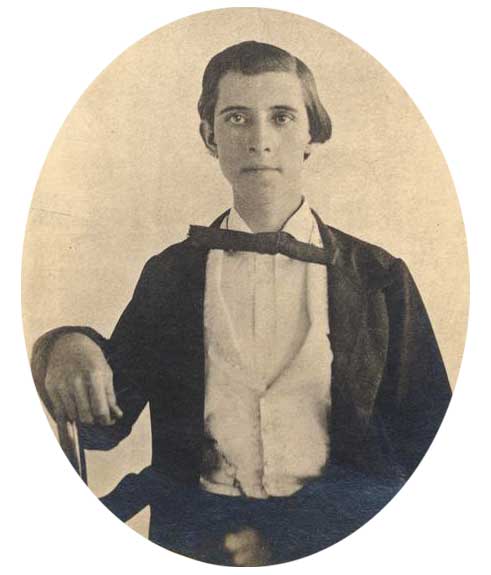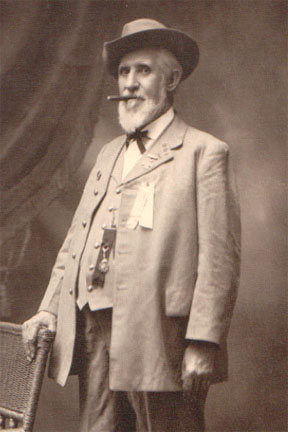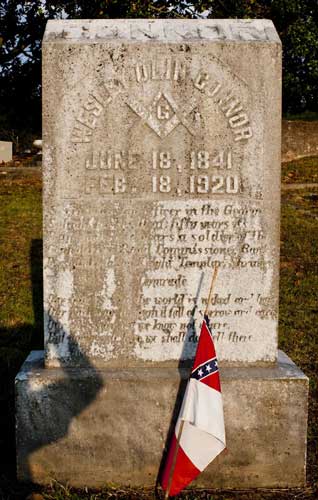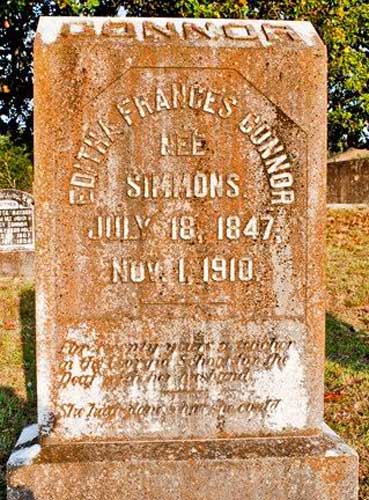
Tuesday May 12, 8h A.M. Warrenton,
Mississippi. The
gunboat lies on the Louisiana shore opposite Warrenton.
Items: Cold [corn] sold in Richmond Va. A few days since at $4.50;
cornfield peas sold in Lynchburg Va. at $5.00 per quart. In Atlanta
Georgia syrup is worth $10.00 per gallon. Board at the hotels costs
$6.00 per day. In Vicksburg, flour sells at from $100.00 to $125.00 per
barrel; good letter paper $4.00 and $5.00 per quire; brogans $15.00 and
$20.00; hats, common $20.00, $20.00 and $25.00; pocket knives, two
blades, $15.00 and $20.00. Coffee $5.00 per pound; butter $2.00 per
pound; eggs $2.00 per dozen; bread 50 cents per loaf; and Faber's
pencils $1.50 each.
Tuesday May 12, 6 o'clock P.M.
Left our camp near Warrenton and moved eastward.
Near Bovina, Wednesday, 12 o'clock.
Marched all last night, and today. Have just halted for an hour's rest,
and to allow the horses to eat. Will cross Big Black and still continue
our march eastward. Destination not known. God grant that we are not
evacuating Vicksburg. Movements very suspicious.
Edwards Depot, Thursday May 14.
Took our position in line of battle one mile southeast of Edwards Depot
yesterday evening. The enemy is reported moving in this direction.
Friday morning, May 15, 7h A.M.
Left our position near Edwards, marched two hundred yards, halted an
hour or two, and then marched back to our position to await further
orders. 6 o'clock P.M. Left our position again, and marched eastward
several miles and then southward. Bivouacked five or six miles from
Edwards Depot.
Saturday May 16, 7 o'clock A.M.
The soldiers were aroused this morning, rations of beef issued with
instructions to jerk it, and soon they were busy digging pits and
erecting scaffolds as if no enemy was near. Few if any of the soldiers
were thinking of meeting him, when suddenly the booming of cannon in
front announced in thunder tones, that he was upon us; that there was
work to do. Movements immediately began, which from the hurry and
confusion led them to believe that the Generals were not fully posted,
and in addition to this a report was going the rounds that General
Johnston, after a slight resistance, had evacuated Jackson.
10 A.M. Our battery has taken a position in a rye
field. Heavy fighting with infantry on the left and immediately to our
right, a hot artillery duel is being fought between a Yankee and
Missouri battery. Firing of small arms still increasing to the left. Our
line now, is two sides of a square, one portion running parallel to the
railroad, and the other, the one we occupy, running off at a right
angle. It seems to be their idea to cut us off from Vicksburg, and from
our standpoint it looks as if we were in a rather critical situation,
but I suppose General Pemberton knows what he is doing.
As an instance of how unconcerned men can become, in
the presence of danger, our boys have cut bushes and built temporary
shelters as a protection from the sun, and a few even have gone to sleep
while we are expecting every moment to be ordered into battle.
11 o'clock, we were ordered into position on that
portion of the line parallel with the railroad. Moved round and found
General Stevenson's division hotly engaged. Some of the Alabama
regiments had already given back, came into position in a field to the
left of the division within six hundred yards of a Yankee battery of
Napoleon guns. We fired fifteen or twenty rounds from each gun, but it
was hot work. Shot, shell and shrapnel flew thick and fast around us.
Here fell Hutchens, killed, and Lumpkin and Anthony mortally wounded.
Capt. Corput brought us out into the road, and had he
been permitted, could have brought off the guns, the day being already
lost. We were, however ordered back to the right, without having a
position assigned us, and while awaiting orders in the road, a line of
advancing infantry emerged from the woods about two hundred yards in our
front, and as our infantry had given way, and the battery in that
direction already taken, no obstacle to their progress was presented.
Two of our guns were unlimbered in the road, but only succeeded in
firing one charge of canister. As Major Anderson, our chief of Artillery
had fallen, the infantry flying in disorder from the field; many of the
cannoneers had failed to stick to their guns, and the Yanks were close
upon us, Capt. Corput told his men to take care of themselves, and we
were not long in putting the order into execution. I felt so mortified
that I stopped once or twice to make sure that I was not the first to
leave the guns.
Had the Georgians and Alabamians stood up like men,
like the Georgians and Alabamians at Manassas, Richmond, Sharpsburg, and
Fredericksburg, all would have gone well, though Yanks outnumbered us
three to one. However, I ought not to censure them too soon, for, upon
investigation, General Pemberton may have to shoulder it all. He
undoubtedly displayed bad generalship, and the day's work may cost us
Vicksburg.
Sunday May 17, 1863. Battle of Big
Black Bridge. Our forces defeated and falling back to the
entrenchments. Loss heavy in men and artillery. There was another
display of bad generalship – instead of crossing the men and artillery
to the west bank, which was full fifty feet higher than the east, and
afforded a good position for defense, they were kept in some shallow
ditches, and behind cotton bales, thrown up as a protection for the
bridge against cavalry, and offering but a slight impediment to a body
of resolute infantry. Loring's division was cut off yesterday. Remnant
of the army in Vicksburg.
Monday evening, May 18, 1863. Yanks have come up,
and skirmishing is now going on in the direction of the Jackson road. Am
afraid the Confederates are two much demoralized to offer effective
resistance to an enemy flushed with victory.
 |
Wesley O.
Connor, known as the father of education for the deaf in Georgia,
was born near Anderson, South Carolina, on June 18, 1841. As a youth,
he moved to Cave Spring, Georgia, in 1849 to live with a married
sister. Here, in 1857, he began working at the Georgia Institution
for the Deaf and Dumb at Cave Spring in order to learn how to teach
the deaf.
At the outbreak of the Civil War, he joined the
Cherokee Artillery, a volunteer unit from Rome, Georgia. He fought
in numerous battles, including the Vicksburg and Atlanta Campaigns. He was captured and sent to a Union
prison in Ohio, where he remained until the end of the war.
After he was released, Connor returned to Cave Spring
to manage the farm of his sister, whose husband had been killed in
the war. In 1867, he was offered the position of principal of what
would become known as the Georgia School for the Deaf, a position he
held for 49 years. In 1868, he married Editha Simmons.
Conner became nationally recognized for his work with
deaf students and was elected president of the American Convention
of Instructors for the Deaf in 1895. He also associated
with others in the field, most notably Alexander Graham Bell and
Helen Keller. Connor died in Cave Spring on February 18, 1920.


Photograph by Silvia Ford, Findagrave.com
Photograph by Diane Warlaw, Ancestry.com
|



